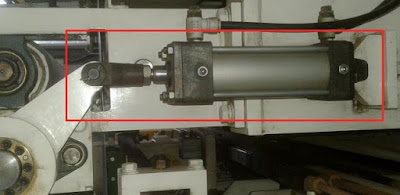Actuator
An actuator is a device that converts energy to linear motion or rotary motion that is operated electrically, manually and by air or fluids. There are two types of actuator are commonly used to hydraulic system. One of them is Linear actuator and other one is rotary actuator. Linear actuator creates straight motion and rotary actuator creates rotary or circular motions they are operated by hydraulic fluids or compressed air.Some pneumatic actuators are listed below:- basic pneumatic system basic hydraulic system types of pumps step by step hydraulic tips
1. Pneumatic actuator
2. Diaphragm pump
3. Air operated oil pump
4. Hydraulic actuator
Pneumatic actuator (Pneumatic cylinder)
Pneumatic cylinder is a linear actuator and it can move forward
and backward. Pneumatic cylinder consist of some parts is listed below
- Rod end Port
- Cap end port
- Barrel
- Piston
- Piston rod
- Tie rod
Diaphragm pump
Diaphragm pump is a positive displacement pump and also a linear actuator that use a reciprocating movement of Diaphragm and displace fluid by opening and closing of suction and discharge valves. Read more about diaphragm pump clickAir operated oil pump
Air operated oil pump is a kind of linear actuator that forcing a piston
toward forth and back to moves fluid in a system.
Hydraulic actuator
- Hydraulic cylinder (Linear actuator)
- Hydraulic motor (Rotary actuator)
-Hydraulic cylinder (Linear actuator)
Hydraulic cylinder is the same as pneumatic cylinder that can also move
forward and backward and known as linear actuator. The main difference
is between pneumatic cylinder and hydraulic cylinder is the power
source. Pneumatic cylinder is operated by compressed air and hydraulic
cylinder is operated by pressurized fluid. And hydraulic cylinder is
more powerful than pneumatic cylinder.
-Hydraulic motor (Rotary actuator)
Usually, Hydraulic motor is a rotary actuator that is used to handle
heavy applications and it can acting directly to the rotary load and
maintain a good acceleration,De-acceleration instant reversal and
stooping. In the above video is showing a hydraulic motor.
Applications
1. Automobiles and forklifts lifting aids
2. Aircraft wings control
3. Excavators and cranes wheel operating
4. Clamping tools and parts 5. Punching operations
6. Molding operations
7. Machine tools positioning
8. Locking work-piece to the specific position.
9. Fluid and air pumping
Basic hydraulic system components. Basic pneumatic system. Basic
hydraulic components pneumatic system hydraulic actuator pneumatic
actuator rotary actuator pneumatic cylinder hydraulic pumps





Post a Comment